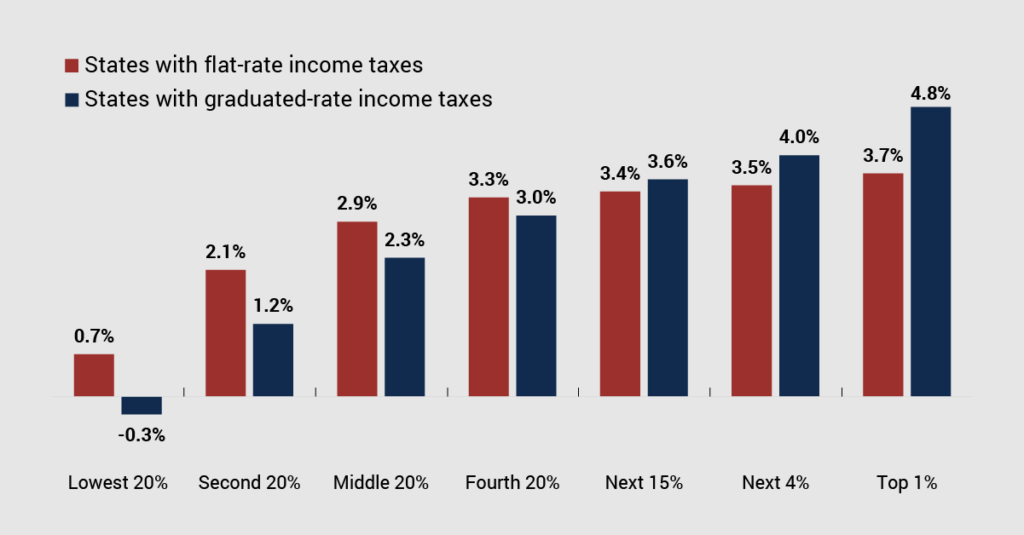This blog appeared first as an op-ed in Common Dreams.
Americans scored a tax victory with last summer’s Inflation Reduction Act, raising hundreds of billions of dollars for climate, health and debt reduction, and breaking a long streak of little progress or even backward movement on tax fairness. Now, with fears of gridlock in a divided Washington, tax justice champions are building momentum in other places where there’s dire need for better tax policy: the states. We can upgrade communities across the country by making 2023 a year to win tax improvements in statehouses.
Let’s start with the good news: lawmakers all over the country are launching campaigns to improve their state tax codes. The people of Massachusetts gave us a head start. They passed a ballot initiative in November to add a 4 percent surcharge on income above a million dollars, having that tiny group pay slightly more than the otherwise flat 5 percent income tax rate. This will generate billions annually to fund schools, restore bridges and make college more affordable. It will make Massachusetts more economically and racially equitable while improving services and infrastructure for residents of all races.
Now advocates in eight more states want to tax wealth in various creative ways. Because extreme wealth is highly concentrated among a small group of the uber-rich, this approach makes a lot of sense. My colleagues at the Institute on Taxation and Economic Policy (ITEP) recently found that more than one in four dollars of wealth in the U.S. is held by a tiny fraction (0.25 percent!) of households with net worth exceeding $30 million.
When it comes to basing taxation on ability to pay, there is good precedent to build on. Four in five states already have income taxes and two-thirds of those states levy lower rates on low earnings and higher rates on income above a certain threshold. That approach—called a graduated income tax—works well because it raises more from those more able to pay, unlike sales taxes which disproportionately hit poor and middle-income families who have to spend most of what they earn.
But not all the news is rosy. In over half the states with income taxes, moneyed interests are pushing to cut or eliminate those taxes, even though history tells us that cutting income taxes—especially by eliminating graduated rates for higher earnings—means higher taxes on property or on purchases (to make up for the lost revenue), lower revenue despite that (because you’d have to raise these other taxes a lot to fully close the gap), and less equity across income and racial categories.
This insightful map tracks what lawmakers in every state are trying to do. Some made their tax codes worse last year and many still want to go in the wrong direction. This is especially bad because, despite the existence of income taxes, most state tax structures as a whole are already upside down, requiring a higher average share of the income of poor and middle-income families than of the rich and uber-rich who already get the most out of our economy.
This unwillingness to have the rich pay their fair share at the federal or state level means we all suffer. That’s why American parents struggle to afford childcare that other countries ensure. It’s why we don’t have universal healthcare or parental leave, in contrast to most of the rest of the world. And it’s why college is now so hard to afford.
Lawmakers pushing ill-considered tax cuts are doing so on top of previous underfunding that meant Iowa slashed unemployment benefits, Utah neglected disability assistance, and Mississippi left its sewage systems in a desperate state of disrepair, to cite just a few examples.
Enough. Kids in Louisiana deserve great schools and teachers in Indiana deserve fair pay. Truckers from Oregon to Florida should have health insurance and be able to see a doctor. And a childcare worker—in any state—should be paid enough to retire with dignity.
If we want more tax fairness from coast to coast, let’s push back on the destructive proposals to cut already-too-low taxes on wealthy people and corporations. And let’s jump on the innovative ideas to tax wealth and income from wealth. The result will be a country with stronger schools, healthier communities, and more equity for residents from coast to coast.





